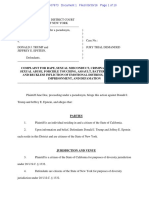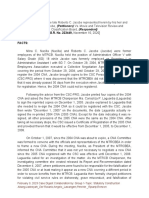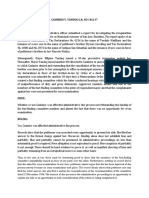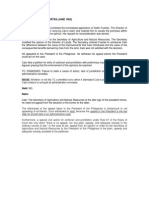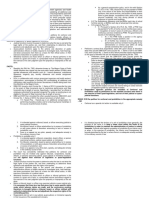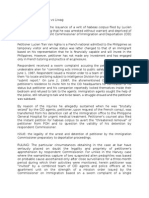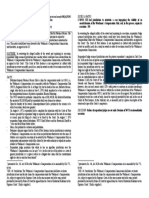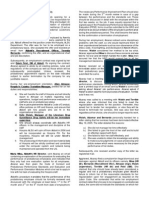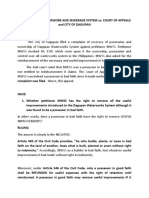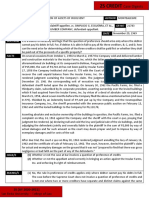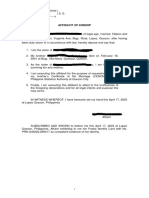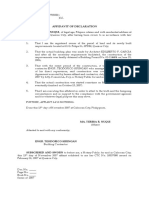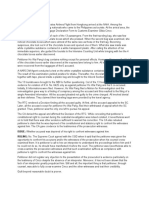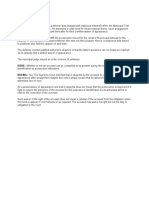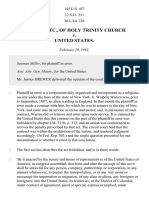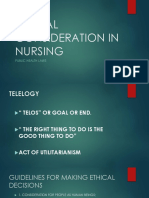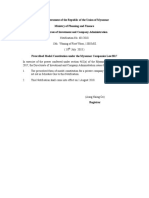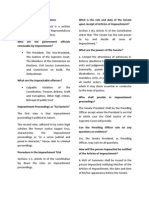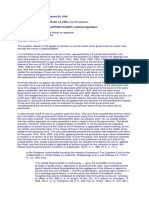GLOBE v. NTC
GLOBE v. NTC
Uploaded by
Francis Coronel Jr.Copyright:
Available Formats
GLOBE v. NTC
GLOBE v. NTC
Uploaded by
Francis Coronel Jr.Original Description:
Original Title
Copyright
Available Formats
Share this document
Did you find this document useful?
Is this content inappropriate?
Copyright:
Available Formats
GLOBE v. NTC
GLOBE v. NTC
Uploaded by
Francis Coronel Jr.Copyright:
Available Formats
GLOBE v.
ERC
FACTS: On 4 June 1999, Smart filed a Complaint with public respondent National Telecommunications
Commission praying that NTC order the immediate interconnection of Smarts and Globes GSM networks.
Smart alleged that Globe, with evident bad faith and malice, refused to grant Smarts request for the
interconnection of SMS.
Globe filed its Answer with Motion to Dismiss on 7 June 1999, interposing grounds that the Complaint
was premature, Smarts failure to comply with the condition’s precedent required in Section 6 of NTC
Memorandum Circular 9-7-93,19 and its omission of the mandatory Certification of Non-Forum Shopping.
On 19 July 1999, NTC issued the Order now subject of the present petition.
According to NTC Both Smart and Globe were equally blameworthy for their lack of cooperation in the
submission of the documentation required for interconnection and for having unduly maneuvered the
situation into the present impasse.
NTC held that since SMS falls squarely within the definition of value-added (VAS) service or enhanced-
service given in NTC Memorandum Circular No. 8-9-95 (MC No. 8-9-95) their implementation of
SMS interconnection is mandatory. The NTC also declared that both Smart and Globe have been
providing SMS without authority from it.
Globe filed with the Court of Appeals a petition for Certiorari and Prohibition to nullify and set aside the
Order and to prohibit NTC from taking any further action in the case.
Globe reiterated its previous arguments that the complaint should have been dismissed for failure to
comply with conditions precedent and the non-forum shopping rule. They claimed that NTC acted without
jurisdiction in declaring that it had no authority to render SMS, pointing out that the matter was not raised
as an issue before it at all.
They alleged that the Order is a patent nullity as it imposed an administrative penalty for an offense for
which neither it nor Smart was sufficiently charged nor heard on in violation of their right to due process.
The CA issued a Temporary Restraining Order (TRO) on 31 Aug 1999. In its Memorandum, Globe called
the attention of the CA in an earlier NTC decision regarding Islacom, holding that SMS is a deregulated
special feature and does not require the prior approval of the NTC.
ISSUE: Whether NTC may legally require Globe to secure NTC approval before it continues providing
SMS.
RULING: No. The Supreme Court held that The NTC may not legally require Globe to secure its approval
for Globe to continue providing SMS. This does not imply though that NTC lacks authority to regulate
SMS or to classify it as VAS. However, the move should be implemented properly, through unequivocal
regulations applicable to all entities that are similarly situated, and in an even-handed manner.
This should not be interpreted, however, as removing SMS from the ambit of jurisdiction and review by
the NTC. The NTC will continue to exercise, by way of its broad grant, jurisdiction over Globe and Smart’s
SMS offerings, including questions of rates and customer complaints. Yet caution must be had. Much
complication could have been avoided had the NTC adopted a proactive position, promulgating the
necessary rules and regulations to cope up with the advent of the technologies it superintends. With the
persistent advent of new offerings in the telecommunications industry, the NTC’s role will become more
crucial than at any time before.
Furthermore, every party subject to administrative regulation deserves an opportunity to know, through
reasonable regulations promulgated by the agency, of the objective standards that have to be met, a rule
integral to due process, as it protects substantive rights.
You might also like
- Doe v. Trump Et Al Refiled Complaint 9/30/16Document10 pagesDoe v. Trump Et Al Refiled Complaint 9/30/16davidbix88% (17)
- Mea Builders Vs CADocument1 pageMea Builders Vs CAHaze Q.No ratings yet
- NPC V Sps SaludaresDocument1 pageNPC V Sps SaludaresDiane Dee YaneeNo ratings yet
- Case Digest - Veterans v. Reyes (Admin Law)Document3 pagesCase Digest - Veterans v. Reyes (Admin Law)Aljanna RN100% (1)
- Succession Compilation of CasesDocument15 pagesSuccession Compilation of CasesKeepy Famador100% (1)
- Philo Module 9Document4 pagesPhilo Module 9Girlie Castillo Jimenez100% (1)
- Ethics FinalsDocument104 pagesEthics Finalsmarriam100% (1)
- Globe Telecom Vs NTCDocument2 pagesGlobe Telecom Vs NTCJ. LapidNo ratings yet
- January 11, 2018 - G.R. No. 196890 - Case DigestDocument2 pagesJanuary 11, 2018 - G.R. No. 196890 - Case DigestJed AlfonsoNo ratings yet
- Brandeis Doctrine of Assimilation of FactsDocument1 pageBrandeis Doctrine of Assimilation of FactsCeline Cabading100% (1)
- Digest TOCAO Vs CA 2Document1 pageDigest TOCAO Vs CA 2MalolosFire BulacanNo ratings yet
- Acuzar vs. Jorolan Et. Al.Document2 pagesAcuzar vs. Jorolan Et. Al.Jay Mark EscondeNo ratings yet
- Calma v. CADocument2 pagesCalma v. CABing BongoNo ratings yet
- GSIS Vs CSC Case DigestDocument2 pagesGSIS Vs CSC Case DigestEbbe DyNo ratings yet
- Industrial Power Sales v. Sinsuat, 160 SCRA 19Document4 pagesIndustrial Power Sales v. Sinsuat, 160 SCRA 19Bibi JumpolNo ratings yet
- PAHILA-GARRIDO vs. TORTOGO Et. Al. - TALAGADocument3 pagesPAHILA-GARRIDO vs. TORTOGO Et. Al. - TALAGAreginacarlatalagalawNo ratings yet
- 23) GR No.130196 - ManginsayDocument1 page23) GR No.130196 - ManginsayLeopoldo, Jr. BlancoNo ratings yet
- LABSTAN - Republic - Vs - Principalia ManagementDocument2 pagesLABSTAN - Republic - Vs - Principalia Managementmichelle zatarain100% (1)
- ISA Vs CADocument1 pageISA Vs CALiaa AquinoNo ratings yet
- FIRST UNITED and BLUE STAR vs. BAYANIHAN AUTOMOTIVEDocument2 pagesFIRST UNITED and BLUE STAR vs. BAYANIHAN AUTOMOTIVEMac SorianoNo ratings yet
- 009 - Board of Trustees of GSIS v. VelascoDocument3 pages009 - Board of Trustees of GSIS v. VelascoIhna Alyssa Marie SantosNo ratings yet
- Robles v. CA, G.R No. 123509, March 14, 2000Document2 pagesRobles v. CA, G.R No. 123509, March 14, 2000Rizchelle Sampang-ManaogNo ratings yet
- Group 1 - Case DigestDocument6 pagesGroup 1 - Case DigestANGELO DEL ROSARIONo ratings yet
- Suntay v. PeopleDocument5 pagesSuntay v. PeopleIldefonso HernaezNo ratings yet
- 6 Casimiro v. Tandog, G.R. No. 146137, 8 June 2005Document1 page6 Casimiro v. Tandog, G.R. No. 146137, 8 June 2005loschudent100% (1)
- Edi Vs NLRC GranDocument2 pagesEdi Vs NLRC GranAnne Ausente BerjaNo ratings yet
- Respondents, G.R. No. 187317. April 11, 2013Document3 pagesRespondents, G.R. No. 187317. April 11, 2013Jim M. MagadanNo ratings yet
- CALO vs. FUERTESDocument1 pageCALO vs. FUERTESkelbingeNo ratings yet
- Declaratory Relief - My PartDocument9 pagesDeclaratory Relief - My PartCristian RamirezNo ratings yet
- White V RoughtonDocument1 pageWhite V Roughtonmjfernandez15No ratings yet
- Orozco v. TexasDocument2 pagesOrozco v. TexasTon RiveraNo ratings yet
- Cawad V AbadDocument2 pagesCawad V AbadClarence Protacio100% (1)
- Lucien Tran Van Nghia Vs LiwagDocument2 pagesLucien Tran Van Nghia Vs Liwagbowdz100% (1)
- Nocnoc v. VeraDocument1 pageNocnoc v. VeraTherese AmorNo ratings yet
- Juco v. NLRCDocument2 pagesJuco v. NLRCGia DimayugaNo ratings yet
- LUZON DEVELOPMENT BANK vs. ALDBEDocument1 pageLUZON DEVELOPMENT BANK vs. ALDBEEi Ar TaradjiNo ratings yet
- P V BadosoDocument3 pagesP V BadosoEduard Doron FloresNo ratings yet
- Abbott Lab V Alcaraz Case DigestDocument3 pagesAbbott Lab V Alcaraz Case Digestyasuren2No ratings yet
- Rural Bank of Makati vs. MakatiDocument7 pagesRural Bank of Makati vs. Makaticmv mendozaNo ratings yet
- Aratuc VS ComelecDocument1 pageAratuc VS ComelecJ. LapidNo ratings yet
- Beja. Sr. vs. Court of Appeals G.R. No. 97149 31 March 1992 FactsDocument6 pagesBeja. Sr. vs. Court of Appeals G.R. No. 97149 31 March 1992 FactsLizzy WayNo ratings yet
- 03 - Radiowealth, Inc. v. Agregado, G.R. No. L-3066, May 22, 1950.Document3 pages03 - Radiowealth, Inc. v. Agregado, G.R. No. L-3066, May 22, 1950.roy rebosuraNo ratings yet
- 01 Tirazona vs. Phil Eds Techno ServiceDocument1 page01 Tirazona vs. Phil Eds Techno ServiceCarlo FernandezNo ratings yet
- People of The Philippines Vs MendozaDocument2 pagesPeople of The Philippines Vs MendozaannaNo ratings yet
- Admin-148-Neria V Commissioner of ImmigrationDocument2 pagesAdmin-148-Neria V Commissioner of ImmigrationNiq PolidoNo ratings yet
- MWSS vs. CADocument2 pagesMWSS vs. CATrisha Paola TanganNo ratings yet
- 30 B.F. Goodrich Philippines, Inc. v. Workmen's Compensation Commission, G.R. No. L-38569, 29 March 1988Document2 pages30 B.F. Goodrich Philippines, Inc. v. Workmen's Compensation Commission, G.R. No. L-38569, 29 March 1988loschudent0% (1)
- Paper Industries Corporation of The Philippines V LaguesmaDocument2 pagesPaper Industries Corporation of The Philippines V LaguesmaJenny Mary DagunNo ratings yet
- Maceda vs. ErbDocument1 pageMaceda vs. ErbFrancis Coronel Jr.No ratings yet
- CIVPRO Case DigestDocument2 pagesCIVPRO Case DigestBenedick LedesmaNo ratings yet
- JULIAN YAP Vs SANTIAGO TANADADocument2 pagesJULIAN YAP Vs SANTIAGO TANADAGale Charm SeñerezNo ratings yet
- Shioji v. HarveyDocument2 pagesShioji v. HarveyJazz TraceyNo ratings yet
- 01.yau Chu Vs CA G.R. No. L-78519Document2 pages01.yau Chu Vs CA G.R. No. L-78519Anasor GoNo ratings yet
- Case Digest (Garcia Vs CA)Document2 pagesCase Digest (Garcia Vs CA)Ax ScribdNo ratings yet
- Ang Tibay Vs Court of Industrial Relations (G.R. No. L-46496. February 27, 1940)Document2 pagesAng Tibay Vs Court of Industrial Relations (G.R. No. L-46496. February 27, 1940)Ei Bin100% (2)
- Credit Pacific Farms Vs EsguerraDocument2 pagesCredit Pacific Farms Vs Esguerramichelle zatarainNo ratings yet
- Case #1 - Manila Electric Co. V QuisimbingDocument9 pagesCase #1 - Manila Electric Co. V QuisimbingChey DumlaoNo ratings yet
- Leviste v. Legaspi TowersDocument2 pagesLeviste v. Legaspi TowersDamunm InjuriaNo ratings yet
- Admin - I - 15. Spo1 Acuzar Vs Jorolan and CA GR No. 177878Document1 pageAdmin - I - 15. Spo1 Acuzar Vs Jorolan and CA GR No. 177878Ervin Franz Mayor Cuevillas100% (1)
- Petition For Authority To Continue Use of The Name SyripDocument2 pagesPetition For Authority To Continue Use of The Name Syriplucky javellanaNo ratings yet
- Digests - Ethics Canon 7-9Document9 pagesDigests - Ethics Canon 7-9onlineonrandomdaysNo ratings yet
- CortesDocument2 pagesCortesimXinYNo ratings yet
- Grande Vs PNTCDocument1 pageGrande Vs PNTCJBLNo ratings yet
- Republic Vs Tan Song BokDocument1 pageRepublic Vs Tan Song BokVirnadette LopezNo ratings yet
- Globe Telecom vs. NTCDocument1 pageGlobe Telecom vs. NTCTina TinsNo ratings yet
- Affidavit of KINSHIPDocument1 pageAffidavit of KINSHIPFrancis Coronel Jr.No ratings yet
- Affidavit of No EmploymentDocument1 pageAffidavit of No EmploymentroshanNo ratings yet
- Affidavit of Loss or CR of MotorcycleDocument1 pageAffidavit of Loss or CR of MotorcycleroshanNo ratings yet
- Affloss Or's From Asian LandDocument1 pageAffloss Or's From Asian LandFrancis Coronel Jr.No ratings yet
- Normal 6080dc60ce7b7Document1 pageNormal 6080dc60ce7b7Apollo EscarchaNo ratings yet
- Affloss Senior Atm Card From LandbankDocument1 pageAffloss Senior Atm Card From LandbankFrancis Coronel Jr.No ratings yet
- Peñoso CMC ResearchDocument26 pagesPeñoso CMC ResearchFrancis Coronel Jr.No ratings yet
- Affidavit of Declaration To Purchased Property On MarriageDocument2 pagesAffidavit of Declaration To Purchased Property On MarriageFrancis Coronel Jr.No ratings yet
- Affloss Report CardDocument1 pageAffloss Report CardFrancis Coronel Jr.No ratings yet
- Peñoso Research InstrumentDocument3 pagesPeñoso Research InstrumentFrancis Coronel Jr.No ratings yet
- Affidavit of Date of Birth Princess Norene QuinonesDocument2 pagesAffidavit of Date of Birth Princess Norene QuinonesFrancis Coronel Jr.No ratings yet
- Affidavit of Declaration To Construction Virginia BenitoDocument2 pagesAffidavit of Declaration To Construction Virginia BenitoFrancis Coronel Jr.No ratings yet
- SPOUSES SEFRINO Vs CADocument1 pageSPOUSES SEFRINO Vs CAFrancis Coronel Jr.No ratings yet
- Midterm Sched 2nd 2022 2023Document6 pagesMidterm Sched 2nd 2022 2023Francis Coronel Jr.No ratings yet
- Affidavit of Declaration To ConstructionDocument1 pageAffidavit of Declaration To ConstructionFrancis Coronel Jr.100% (1)
- MERALCO Vs CENTRALDocument1 pageMERALCO Vs CENTRALFrancis Coronel Jr.No ratings yet
- People v. GerolagaDocument1 pagePeople v. GerolagaFrancis Coronel Jr.No ratings yet
- Affidavit of Declaration To Purchased Property CalderonDocument1 pageAffidavit of Declaration To Purchased Property CalderonFrancis Coronel Jr.No ratings yet
- Affidavit of Declaration To Purchased PropertyDocument2 pagesAffidavit of Declaration To Purchased PropertyFrancis Coronel Jr.No ratings yet
- MINDANAO BUS Vs CITY ASSESSORDocument1 pageMINDANAO BUS Vs CITY ASSESSORFrancis Coronel Jr.No ratings yet
- International School v. QuisumbingDocument1 pageInternational School v. QuisumbingFrancis Coronel Jr.No ratings yet
- CUDIA v. PMADocument1 pageCUDIA v. PMAFrancis Coronel Jr.No ratings yet
- Ho Wai Pang v. PeopleDocument1 pageHo Wai Pang v. PeopleBaphomet JuniorNo ratings yet
- PEOPLE v. CABILESDocument1 pagePEOPLE v. CABILESFrancis Coronel Jr.No ratings yet
- Corredo v. PeopleDocument1 pageCorredo v. PeopleFrancis Coronel Jr.No ratings yet
- Diaz Vs TimbolDocument1 pageDiaz Vs TimbolFrancis Coronel Jr.No ratings yet
- Maceda vs. ErbDocument1 pageMaceda vs. ErbFrancis Coronel Jr.No ratings yet
- Roxas v. VasquezDocument1 pageRoxas v. VasquezFrancis Coronel Jr.No ratings yet
- Ocampo v. OmbudsmanDocument1 pageOcampo v. OmbudsmanFrancis Coronel Jr.No ratings yet
- TMOBILEUSAINCmacn-A006 - Affidavit of Universal Commercial Code 1 Financing Statement LienDocument6 pagesTMOBILEUSAINCmacn-A006 - Affidavit of Universal Commercial Code 1 Financing Statement LienMalik Zahid Bey100% (1)
- KP Act 2005Document4 pagesKP Act 2005Imran Khan100% (1)
- CE 2017 Security Clearance ProformaDocument5 pagesCE 2017 Security Clearance ProformatanoligNo ratings yet
- Church of Holy Trinity v. United States, 143 U.S. 457 (1892)Document12 pagesChurch of Holy Trinity v. United States, 143 U.S. 457 (1892)Scribd Government DocsNo ratings yet
- ResolutionDocument7 pagesResolutionMaanNo ratings yet
- FR-39-2017-18 Final ResultDocument101 pagesFR-39-2017-18 Final ResultErUmangKoyaniNo ratings yet
- Frisco ISD Response To Attorney General LetterDocument2 pagesFrisco ISD Response To Attorney General LetterKERANews100% (1)
- Pecci Vs NLRCDocument3 pagesPecci Vs NLRCBec Bec BecNo ratings yet
- Final Exam in ComparativeDocument6 pagesFinal Exam in ComparativeJodelen B. PercolNo ratings yet
- The Meaning and Making of EmancipationDocument215 pagesThe Meaning and Making of EmancipationPrologue Magazine100% (7)
- Expression of Interest Dgurgaon M3MDocument8 pagesExpression of Interest Dgurgaon M3MNew Launch GurgaonNo ratings yet
- ThesisDocument41 pagesThesisLouem Garceniego80% (10)
- Mike Crites BioDocument2 pagesMike Crites BiowmdtvmattNo ratings yet
- 113s. Collector of Internal Revenue v. IsasiDocument2 pages113s. Collector of Internal Revenue v. IsasiBobby Olavides SebastianNo ratings yet
- Advertising (Breakout Room 2)Document7 pagesAdvertising (Breakout Room 2)Hammad MajidNo ratings yet
- Ethical Consideration in NursingDocument36 pagesEthical Consideration in NursingShing Mae MarieNo ratings yet
- Concept of Judicial ReviewDocument22 pagesConcept of Judicial ReviewHarshSuryavanshiNo ratings yet
- Prescribed Model Constitution Under The Myanmar Companies Law 2017Document31 pagesPrescribed Model Constitution Under The Myanmar Companies Law 2017Nelson100% (1)
- Alpha Insurance Vs CADocument16 pagesAlpha Insurance Vs CAlalisa lalisaNo ratings yet
- Impeachment in The PhilippinesDocument3 pagesImpeachment in The Philippineseunisflamme100% (1)
- Consent For MTP PDFDocument4 pagesConsent For MTP PDFMajid SheikhNo ratings yet
- Fam Law ProjectDocument12 pagesFam Law ProjectGokul AbimanyuNo ratings yet
- Dela Vina v. CollectorDocument2 pagesDela Vina v. CollectorBenedick LedesmaNo ratings yet
- Equity Leans Against JT - in Re Woolley 1903 CH.DDocument5 pagesEquity Leans Against JT - in Re Woolley 1903 CH.DPersephone WestNo ratings yet
- Letter To Channel 4 Re: Michael Jackson DocumentaryDocument3 pagesLetter To Channel 4 Re: Michael Jackson DocumentaryNG19250No ratings yet
